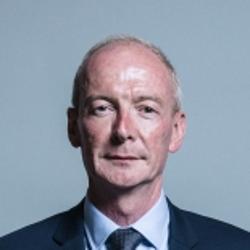
Pat McFadden
Labour - Wolverhampton South East
9,188 (27.5%) majority - 2024 General ElectionFirst elected: 5th May 2005
Secretary of State for Work and Pensions
(since September 2025)13 Former APPG Officer Positions
Black Country, Black Country Economy, British Sikhs, Fourth Industrial Revolution, Iraq, Ireland and the Irish in Britain, Markets, New and Advanced Technologies, Obesity, Sickle Cell and Thalassaemia, Sickle Cell and Thalassemia, Sikhs, UK and EuropeDivision Voting information
Debates during the 2024 Parliament
Speeches made during Parliamentary debates are recorded in Hansard. For ease of browsing we have grouped debates into individual, departmental and legislative categories.
Sparring Partners
(37 debate interactions)
(12 debate interactions)
Department Debates
(367 debate contributions)
(126 debate contributions)
Legislation Debates
(4,888 words contributed)
(1,478 words contributed)
Wolverhampton South East Petitions
e-Petitions are administered by Parliament and allow members of the public to express support for a particular issue.
If an e-petition reaches 10,000 signatures the Government will issue a written response.
If an e-petition reaches 100,000 signatures the petition becomes eligible for a Parliamentary debate (usually Monday 4.30pm in Westminster Hall).
of 241,175 signatures (0.37%)
of 147,944 signatures (0.17%)
of 184,365 signatures (0.15%)
of 153,001 signatures (0.15%)
of 717,189 signatures (0.14%)
of 241,175 signatures (0.37%)
of 192,883 signatures (0.14%)
of 184,365 signatures (0.15%)
of 147,944 signatures (0.17%)
Latest EDMs signed by Pat McFadden
Commons initiatives
These initiatives were driven by Pat McFadden, and are more likely to reflect personal policy preferences.
MPs who are act as Ministers or Shadow Ministers are generally restricted from performing Commons initiatives other than Urgent Questions.
Pat McFadden has not been granted any Urgent Questions
Pat McFadden has not been granted any Adjournment Debates
3 Bills introduced by Pat McFadden
A bill to Make provision for persons of the Roman Catholic faith to be eligible to hold the office of His Majesty’s High Commissioner to the General Assembly of the Church of Scotland.
This Bill received Royal Assent on 3rd April 2025 and was enacted into law.
A Bill to remove the remaining connection between hereditary peerage and membership of the House of Lords; to make provision about resignation from the House of Lords; to abolish the jurisdiction of the House of Lords in relation to claims to hereditary peerages; and for connected purposes.
A Bill to Make provision to remove the two child limit on the child element of universal credit.
Thursday 12th March 2026
1 Bill co-sponsored by Pat McFadden
Transparency and Accountability (European Union) Bill 2015-16
Sponsor - Caroline Lucas (Green)